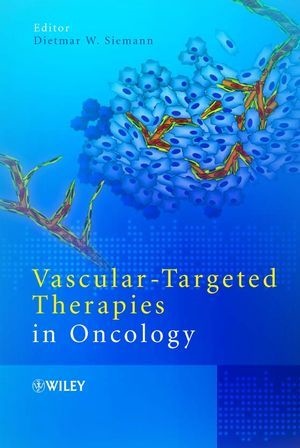Read more
Informationen zum Autor Dietmar W. Siemann is the editor of Vascular-Targeted Therapies in Oncology , published by Wiley. Klappentext Attacking a tumor's supportive blood vessel network may offer novel means of improving cancer cure rates. The vasculature is critical to tumor development, survival, growth and metastatic spread. However, tumor blood vessels are abnormal, both morphologically and functionally, and display characteristics that distinguish them from normal vasculature. It is these inherent differences between blood vessels associated with tumors and those associated with normal tissues that provide a variety of unique targets for the design of novel therapeutics and treatment strategies highly selective for the cancer.Vascular-disrupting strategies aim to cause a rapid and catastrophic shutdown in the established vessel networks of solid tumors. This arrests the blood flow and induces tumor cell death as a result of oxygen and nutrient deprivation and build up of waste products. Biological vascular-disrupting approaches include targeted gene therapy, antibodies to neovascular antigens and ligand-directed therapies targeting endothelial cell receptors and extracellular matrix proteins. Small molecule drug approaches have focused primarily on flavenoids and tubulin-binding agents. This book examines the fundamental bases of both these approaches. Emphasis is placed on target development, preclinical assessment, use in combination with conventional treatment regimens and the current clinical status of these therapies.This book is intended for cancer researchers and clinical oncologists. Its goal is to review the potential of vascular-targeting strategies in cancer management and to foster an understanding of the key differences between these therapeutic approaches and conventional anticancer treatments. Though more research is required to establish the clinical efficacy and ideal application of vascular-disrupting strategies, this developing anticancer approach continues to generate great research interest and clinical optimism. Zusammenfassung Vascular-Targeted Therapies in Oncology reviews the current status and future potential of vascular disrupting approaches in cancer management. Such treatments perturb the supply of oxygen and nutrients to the tumor tissue, resulting in ischaemia and necrosis. Inhaltsverzeichnis Preface xiii List of Contributors xv 1 Tumor Vasculature: a Target for Anticancer Therapies 1 Dietmar W. Siemann 1.1 Introduction 1 1.2 Tumor vasculature 1 1.3 Impact of tumor microenvironments on cancer management 2 1.4 Vascular-targeting therapies 3 1.5 Combinations with conventional anticancer therapies 4 1.6 Combinations of antiangiogenic and vascular-disrupting agents 5 1.7 Conclusions 5 Acknowledgments 6 References 6 2 Abnormal Microvasculature and Defective Microcirculatory Function in Solid Tumors 9 Peter Vaupel 2.1 Introduction 9 2.2 Basic principles of blood vessel formation in tumors 10 2.3 Tumor lymphangiogenesis 13 2.4 Tumor vascularity and blood fl ow 13 2.5 Volume and composition of the tumor interstitial space 17 2.6 Fluid pressure and convective currents in the interstitial space of tumors 18 2.7 Evidence, characterization and pathogenesis of tumor hypoxia 18 2.8 Tumor pH 23 2.9 The 'crucial Ps' characterizing the hostile metabolic microenvironment of solid tumors 25 Acknowledgment 27 References 27 3 The Role of Microvasculature in Metastasis Formation 31 Oliver Stoeltzing and Lee M. Ellis 3.1 Introduction 31 3.2 Regulators of angiogenesis in solid tumors 34 3.3 Angiogenesis and metastasis formation 47 3.4 Summary 53 References 53 4 Development of Agents tha...

